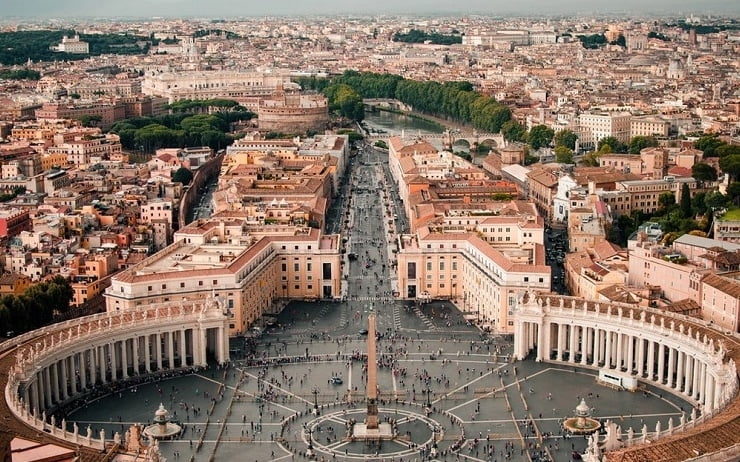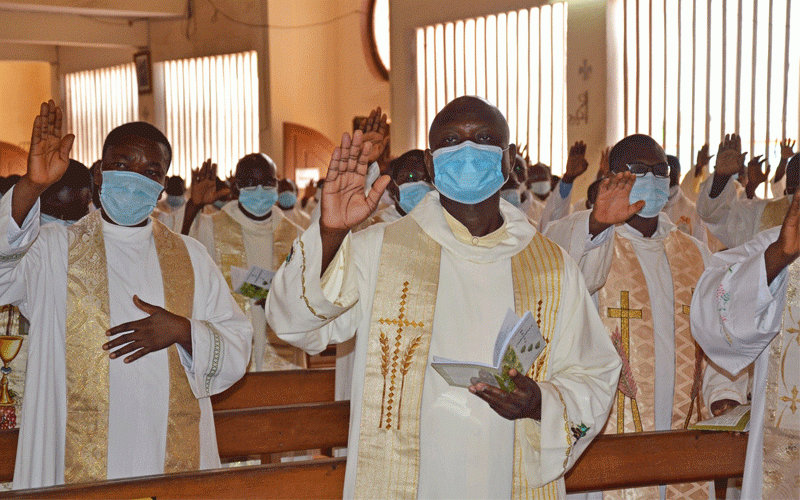Selon le journal italien Corriere Della Sera, l’archevêque Paul Gallagher, secrétaire du Vatican pour les relations avec les États, a remis le 17 juin une note diplomatique formelle à l’ambassade d’Italie près le Saint-Siège, exprimant sa préoccupation concernant le texte en débat.
Les médias locaux ont qualifié l’action du Vatican de « sans précédent » dans l’histoire des relations entre les deux États.
Le projet de loi « anti-homophobie », connu sous le nom de « Ddl Zan », est en cours d’examen par la commission justice du Sénat italien, après que le texte a reçu l’approbation initiale de la Chambre en novembre dernier.
Le projet de loi vise à prévenir et à combattre « la discrimination et la violence pour des raisons fondées sur le sexe, le genre, l’orientation sexuelle, l’identité de genre et le handicap ».
Le Corriere Della Sera a rapporté que la note du Vatican indiquait que certaines parties de la législation réduisent la liberté garantie à l’Église catholique par l’article 2, paragraphes 1 et 3 de l’Accord pour la révision du Pacte.
En 1984, l’Italie et le Saint-Siège ont signé un accord modifiant les Pactes du Latran de 1929. L’accord garantit que la République italienne reconnaît « la pleine liberté de l’Église catholique pour mener à bien sa mission pastorale, éducative et caritative, d’évangélisation et de sanctification. »
Selon l’article 2, paragraphe 3 de l’accord, « Les catholiques et leurs associations et organisations se voient garantir la pleine liberté de réunion et d’expression de leurs pensées par la parole, l’écrit et tout autre moyen de diffusion.
La « note verbale » de Gallagher – l’équivalent au Vatican d’un ministre des Affaires étrangères – a déclaré que la législation proposée, telle qu’elle est actuellement rédigée, viole cet accord et a demandé son amendement.
Selon le Corriere Della Sera, l’ambassade d’Italie auprès du Saint-Siège a remis la note au cabinet du ministère italien des Affaires étrangères et au bureau des relations avec le parlement. Il devrait ensuite être présenté au Premier ministre Mario Draghi et au parlement.
Les évêques italiens ont également fait part de leurs inquiétudes concernant ce que certains en Italie ont surnommé le projet de loi «homotransphobe». Le mois dernier, l’archevêque Gualtiero Bassetti, président de la conférence des évêques italiens, a appelé à plus de « dialogue ouvert » sur la question « pour parvenir à une solution sans ambiguïté ni étirement législatif ».
Dans une déclaration de juin 2020, les évêques ont exprimé des réserves sur le projet de loi, affirmant que dans la protection de la personne en droit italien « non seulement il n’y a pas de vide réglementaire, mais aussi il n’y a pas de lacunes qui justifient l’urgence de nouvelles dispositions ».
Ils ont également déclaré que l’introduction de nouvelles sanctions légales contre la discrimination risquait de porter atteinte à la liberté d’expression et d’introduire un « crime d’opinion ».
« Plutôt que de punir la discrimination, cela finirait par frapper l’expression d’une opinion légitime, comme l’a appris l’expérience des systèmes juridiques d’autres nations dans lesquelles des réglementations internes similaires ont déjà été introduites », indique le communiqué.
Informações que chegaram ao escritório da RECOWACERAO NEWS AGENCY, RECONA, por meio de seu correspondente adido ao escritório do Vaticano, indicou que o Vaticano interveio junto ao Estado italiano em uma proposta de lei « anti-homofobia », dizendo que a legislação conforme escrita viola as liberdades dos Igreja Católica na Itália.
De acordo com o jornal italiano Corriere Della Sera, o arcebispo Paul Gallagher, secretário do Vaticano para as relações com os Estados, deu uma nota diplomática formal à embaixada italiana junto à Santa Sé em 17 de junho, expressando preocupação com o texto em debate.
A mídia local chamou a ação do Vaticano de « sem precedentes » na história da relação entre os dois estados.
O projeto de lei “anti-homofobia”, conhecido pelo nome de “Ddl Zan”, está sendo examinado pela comissão de justiça do Senado italiano, depois que o texto recebeu aprovação inicial da Câmara em novembro passado.
O projeto de lei visa prevenir e se opor à “discriminação e violência por motivos de sexo, gênero, orientação sexual, identidade de gênero e deficiência”.
O Corriere Della Sera informou que a nota do Vaticano afirmava que partes da legislação reduzem a liberdade garantida à Igreja Católica pelo artigo 2, parágrafos 1 e 3 do Acordo para a revisão do Pacto.
Em 1984, a Itália e a Santa Sé assinaram um acordo que altera os Pactos de Latrão de 1929. O acordo garante que a República Italiana reconhece “a plena liberdade da Igreja Católica para cumprir a sua missão pastoral, educativa e caritativa, de evangelização e santificação. ”
De acordo com o artigo 2, parágrafo 3 do acordo, “aos católicos e suas associações e organizações é garantida a plena liberdade de reunião e expressão do pensamento por meio da palavra, da escrita e de qualquer outro meio de divulgação.
A “nota verbal” de Gallagher – o equivalente do Vaticano a um ministro das Relações Exteriores – disse que a legislação proposta, conforme redigida atualmente, viola este acordo e pediu sua emenda.
Segundo o Corriere Della Sera, a embaixada italiana na Santa Sé entregou a nota ao gabinete do Ministério das Relações Exteriores da Itália e ao escritório para as relações com o parlamento. Em seguida, espera-se que seja apresentado ao primeiro-ministro Mario Draghi e ao parlamento.
Os bispos italianos também levantaram preocupações sobre o que alguns na Itália apelidaram de projeto de lei “homotransfóbico”. No mês passado, o Arcebispo Gualtiero Bassetti, presidente da Conferência Episcopal Italiana, pediu mais “diálogo aberto” sobre a questão “para chegar a uma solução sem ambigüidade e extensão legislativa”.
Em uma declaração de junho de 2020, os bispos expressaram reservas sobre o projeto de lei, dizendo que na proteção da pessoa na lei italiana “não só não há vazio regulatório, mas também não há lacunas que justifiquem a urgência de novas disposições”.
Eles também disseram que a introdução de mais penalidades legais contra a discriminação poderia infringir a liberdade de expressão e introduzir um « crime de opinião ».
“Em vez de punir a discriminação – acabaria atingindo a expressão de uma opinião legítima, como se aprende pela experiência dos sistemas jurídicos de outras nações em que regulamentos internos semelhantes já foram introduzidos”, disse o comunicado.
Information reaching the office of RECOWACERAO NEWS AGENCY, through her correspondent attached to the office of the Vatican has indicated that the Vatican has intervened with the Italian state in a proposed “anti-homophobia” law, saying that the legislation as written violates freedoms of the Catholic Church in Italy.
According to the Italian newspaper Corriere Della Sera, Archbishop Paul Gallagher, the Vatican’s secretary for relations with states, gave a formal diplomatic note to the Italian embassy to the Holy See on June 17, expressing concern about the text under debate.
Local media have called the Vatican’s action “unprecedented” in the history of the relationship between the two states.
The “anti-homophobia” bill, known by the name “Ddl Zan,” is being examined by the justice commission of the Italian Senate, after the text received initial approval from the House last November.
The bill seeks to prevent and oppose “discrimination and violence for reasons based on sex, gender, sexual orientation, gender identity, and disability.”
Corriere Della Sera reported that the Vatican note said that parts of the legislation reduce the freedom guaranteed to the Catholic Church by Article 2, paragraphs 1 and 3 of the Agreement for the revision of the Pact.
In 1984, Italy and the Holy See signed an agreement amending the Lateran Pacts of 1929. The agreement guarantees that the Italian Republic recognizes “the full freedom of the Catholic Church to carry out its pastoral, educational and charitable mission, of evangelization and sanctification.”
According to article 2, paragraph 3 of the agreement, “Catholics and their associations and organizations are guaranteed full freedom of assembly and expression of thought by word, writing and any other means of dissemination.
The “note verbale” from Gallagher — the Vatican’s equivalent of a foreign minister — said that the proposed legislation, as currently written, violates this agreement and asked for its amendment.
According to Corriere Della Sera, the Italian embassy to the Holy See delivered the note to the cabinet of Italy’s foreign ministry and the office for relations with the parliament. It is next expected to be brought before Prime Minister Mario Draghi and the parliament.
The Italian bishops have also raised concerns over what some in Italy have dubbed the “homotransphobic” bill. Last month, Archbishop Gualtiero Bassetti, president of the Italian bishops’ conference, urged more “open dialogue” about the issue “to arrive at a solution without ambiguity and legislative stretch.”
In a June 2020 statement, the bishops expressed reservations about the bill, saying that in the protection of the person in Italian law “not only is there no regulatory vacuum, but also there are no gaps which justify the urgency of new provisions.”
They also said that introducing further legal penalties on discrimination risked infringing on freedom of speech and introducing a “crime of opinion.”
“Rather than punishing discrimination — it would end up striking the expression of a legitimate opinion, as learned by the experience of the legal systems of other nations in which similar internal regulations have already been introduced,” the statement said.
- CATHOLIC ARCHBISHOP IN GHANA HAILS POPE LEO XIV AS GOD’S GIFT - 23 mai 2025
- POPE LEO XIV TO APPROVE CANONIZATIONS - 22 mai 2025
- THE EVOLUTION OF PAPAL TRANSPORTATION - 20 mai 2025







